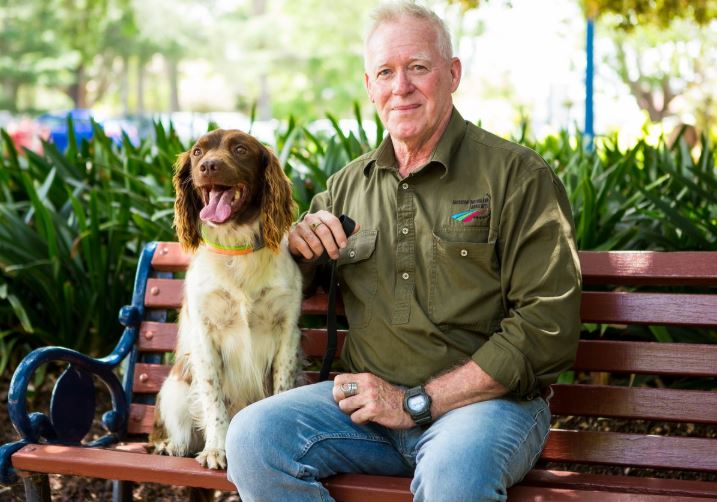Rocky the English springer spaniel and his handler Tom Garrett are a dynamic duo, working together to combat fox predation to the region’s turtle population.
The pair, who are part of SQ Landscapes, recently starred in a video by Burnett Regional Mary Group with Tom discussing his endeavours and highlighting the work achieved over the years to keep turtle numbers strong.
Part of Rocky and Tom’s role is to survey turtle nesting beaches in the Bundaberg, Burnett and Fraser Coast regions to reduce the threat of the European Red Fox.
It’s work that the six-year-old dog has been trained in ever since he was partnered with Tom at eight months old.
“Rocky has been trained to find four different scents,” Tom said.
“The fox scent, rabbit, wild dog and cat.
“He is one of the first multi-scent trained species working in Queensland now for the past five years.”

Tom said the pair were involved in a turtle protection program called Nest to Ocean, which featured active nest protection and predator control efforts to reduce the threat posed by predator species.
“The whole Nest to Ocean funding effort was to try and do something not only about the marine turtles, which lots of people are aware of, but also the fresh water turtles and Mary River turtle,” he said.
“What we work on is the pest side of things. We are interested in the pressures put on those species by introduced pests.
“Particulary at this time of year, the European red fox.”
Tom said he and Rocky first started their endeavours at Mon Repos.
“This is our fourth year now travelling from Mon Repos, round Bundaberg and upwards to far North in those journeys to Agnes Water and Deepwater National Park,” he said.
When it comes to finding foxes, Tom said all he had to do was give Rocky some simple commands and he was off to get the job done.
“Dogs understand short, simple commands,” he said.
“So I will say to him ‘work’ and ‘fox’ and he knows he has to work on a fox.
“He has to quarter the ground and find the scent and follow the scent and take me to the den.”
Tom and Rocky work together to save the turtles
Tom said in their very first exercise, Rocky had found more than 50 dens.
“They were losing up to 30 per cent of their nesting turtle eggs or hatchlings through fox predation at that main nesting beach at Mon Repos.
“It is a bit of a let down to see a nest that has been predated.”
There is good news though- Tom said the loss of turtles had reduced dramatically over the years and foxes were becoming less of a common sight.
“Mon Repos hasn’t had any foxes on the beach in three years,” he said.
Nest to Ocean program a positive for turtle numbers
Since commencement of the Queensland program, more than 20,000 turtle nests have been monitored by Nest to Ocean grant recipients.
The program has consistently achieved greater than 95% nest survival as a result of the predator control activities and direct nest protection.
In total, it is estimated that approximately 1.3 million hatchlings have been protected since the inception of the program.
Find out more here.
- Related stories: Day in the life of zoo wallabies Toby and Rusty




